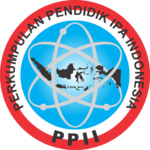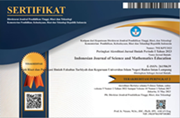Elaboration of High School Student’s Metacognition Awareness on Heat and Temperature Material: Wright Map in Rasch Model
Abstract
Keywords
Full Text:
PDFReferences
N. Y. Indriyanti and S. Yamtinah, “An Inquiry into Students’ Metacognition and Learning Achievement in a Blended Learning Design,” Int. J. Emerg. Technol. Learn., vol. 15, no. 21, pp. 77–88, 2020, doi: 10.3991/ijet.v15i21.12907.
M. I. Sukarelawan and S. Sriyanto, “Mapping of Profile Students’ Metacognitive Awareness in Yogyakarta, Indonesia,” J. Ris. dan Kaji. Pendidik. Fis., vol. 6, no. 2, p. 56, 2019, doi: 10.12928/jrkpf.v6i2.14556.
A. Muhid, E. R. Amalia, H. Hilaliyah, N. Budiana, and M. B. N. Wajdi, “The Effect of Metacognitive Strategies Implementation on Students’ Reading Comprehension Achievement,” Int. J. Instr., vol. 13, no. 2, pp. 847–862, Apr. 2020, doi: 10.29333/iji.2020.13257a.
E. Ahdhianto, Marsigit, Haryanto, and N. N. Santi, “The Effect of Metacognitive-Based Contextual Learning Model on Fifth-Grade Students’ Problem-Solving and Mathematical Communication Skills,” Eur. J. Educ. Res., vol. 9, no. 2, pp. 753–764, Apr. 2020, doi: 10.12973/eu-jer.9.2.753.
R. M. Abdelrahman, “Metacognitive Awareness and Academic Motivation and Their Impact on Academic Achievement of Ajman University Students,” Heliyon, vol. 6, no. 9, p. e04192, Sep. 2020, doi: 10.1016/j.heliyon.2020.e04192.
J. Syahbrudin and A. Anggraini, “Improving The Problem Solving Skill Through Metacognitive Strategies Assisted by Student Worksheets,” J. Educ. Sci. Technol., vol. 5, no. 3, p. 253, Dec. 2019, doi: 10.26858/est.v5i3.10516.
G. M. Harrison and L. M. Vallin, “Evaluating the Metacognitive Awareness Inventory using Empirical Factor-Structure Evidence,” Metacognition Learn., vol. 13, no. 1, pp. 15–38, Apr. 2018, doi: 10.1007/s11409-017-9176-z.
L. Mihalca, C. Mengelkamp, and W. Schnotz, “Accuracy of metacognitive judgments as a moderator of learner control effectiveness in problem-solving tasks,” Metacognition Learn., vol. 12, no. 3, pp. 357–379, 2017, doi: 10.1007/s11409-017-9173-2.
S. A. Tachie, “Meta-cognitive skills and strategies application: How this helps learners in mathematics problem-solving,” Eurasia J. Math. Sci. Technol. Educ., vol. 15, no. 5, pp. 1–12, 2019, doi: 10.29333/ejmste/105364.
S. Nongtodu and Y. Bhutia, “Metacognition and Its Relation with Academic Achievement among College Going Students of Meghalaya,” Int. J. Educ. Psychol. Res., vol. 6, no. 2, pp. 54–60, 2017.
S. Pradhan, “Influence of Metacognition on Academic Achievement and Learning Style of Undergraduate Students in Tezpur University,” Eur. J. Educ. Res., vol. 10, no. 1, pp. 381–391, Jan. 2021, doi: 10.12973/eu-jer.10.1.381.
W. Saputri and A. D. Corebima, “The Correlation between Metacognitive Skills and Cognitive Learning Results of Biology Pre-service Teachers on Different Learnings,” J. Turkish Sci. Educ., vol. 17, no. 4, pp. 487–503, 2020, doi: 10.36681/tused.2020.40.
N. Kristiani, H. Susilo, F. Rohman, and D. C. Aloysius, “The contribution of students’ metacognitive skills and scientific attitude towards their academic achievements in biology learning implementing Thinking Empowerment by Questioning (TEQ) learning integrated with inquiry learning (TEQI),” Int. J. Educ. Policy Res. Rev., vol. 2, no. 9, pp. 113–120, 2015, doi: 10.15739/IJEPRR.020.
K. Craig, D. Hale, C. Grainger, and M. E. Stewart, “Evaluating Metacognitive Self-Reports: Systematic Reviews of the Value of Self-Report in Metacognitive Research,” Metacognition Learn., vol. 15, no. 2, pp. 155–213, Aug. 2020, doi: 10.1007/s11409-020-09222-y.
G. Schraw and R. S. Dennison, “Assessing Metacognitive Awareness,” Contemp. Educ. Psychol., vol. 19, no. 4, pp. 460–475, 1994, doi: 10.1006/ceps.1994.1033.
R. A. Sperling, B. C. Howard, L. A. Miller, and C. Murphy, “Measures of children’s knowledge and regulation of cognition,” Contemp. Educ. Psychol., vol. 27, no. 1, pp. 51–79, 2002, doi: 10.1006/ceps.2001.1091.
J. Meijer, P. Sleegers, M. Elshout-Mohr, M. van Daalen-Kapteijns, W. Meeus, and D. Tempelaar, “The development of a questionnaire on metacognition for students in higher education,” Educ. Res., vol. 55, no. 1, pp. 31–52, 2013, doi: 10.1080/00131881.2013.767024.
H. Haeruddin, Z. K. Prasetyo, and S. Supahar, “The development of a metacognition instrument for college students to solve physics problems,” Int. J. Instr., vol. 13, no. 1, pp. 767–782, Jan. 2020, doi: 10.29333/iji.2020.13149a.
G. Taasoobshirazi and J. Farley, “Construct Validation of the Physics Metacognition Inventory,” Int. J. Sci. Educ., vol. 35, no. 3, pp. 447–459, 2013, doi: 10.1080/09500693.2012.750433.
G. Taasoobshirazi, M. Bailey, and J. Farley, “Physics Metacognition Inventory Part II: Confirmatory Factor Analysis and Rasch Analysis,” Int. J. Sci. Educ., vol. 37, no. 17, pp. 2769–2786, Nov. 2015, doi: 10.1080/09500693.2015.1104425.
Haeruddin, Z. K. Prasetyo, Supahar, E. Sesa, and G. Lembah, “Psychometric and structural evaluation of the physics metacognition inventory instrument,” Eur. J. Educ. Res., vol. 9, no. 1, pp. 215–225, Jan. 2020, doi: 10.12973/eu-jer.9.1.215.
M. I. Sukarelawan, D. Sulisworo, J. Jumadi, H. Kuswanto, and S. A. Rofiqah, “Heat and temperature metacognition awareness inventory: A confirmatory factor analysis,” Int. J. Eval. Res. Educ., vol. 10, no. 2, p. 389, Jun. 2021, doi: 10.11591/ijere.v10i2.20917.
S. S. Amnah, “Profil Kesadaran dan Strategi Metakognisi Mahasiswa Baru Pendidikan Biologi Fakultas Keguruan dan Ilmu Pendidikan Universitas Islam Riau Pekanbaru,” J. Pendidik. IPA Indones., vol. 3, no. 1, pp. 22–27, 2014.
L. Fitria, J. Jamaluddin, and I. P. Artayasa, “Analisis Hubungan antara Kesadaran Metakognitif dengan Hasil Belajar Matematika dan IPA Siswa SMA di Kota Mataram,” J. Kependidikan J. Has. Penelit. dan Kaji. Kepustakaan di Bid. Pendidikan, Pengajaran dan Pembelajaran, vol. 6, no. 1, pp. 147–155, 2020, doi: 10.33394/jk.v6i1.2302.
C. Umam, M. A. Ushuludin, A. S. B. Ningrum, B. Syaifulloh, and D. N. Suci, “Metacognitive Awareness and Self-Efficacy: Do They Contribute to Indonesian EFL Students’ Listening Comprehension Achievement?,” Humanit. Soc. Sci. Rev., vol. 8, no. 4, pp. 138–146, Jul. 2020, doi: 10.18510/hssr.2020.8415.
J. Syahbrudin and A. Anggraini, “Improving The Problem Solving Skill Through Metacognitive Strategies Assisted by Student Worksheets,” J. Educ. Sci. Technol., vol. 5, no. 3, p. 253, 2019, doi: 10.26858/est.v5i3.10516.
R. Agustin, P. Sujatmiko, and I. Kurniawati, “Profil Metakognitif Siswa yang Bergaya Kognitif Reflektif dan Impulsif Kelas VIII SMP Negeri 16 Surakarta Tahun Pelajaran 2016/2017,” J. Pendidik. Mat. dan Mat. Solusi, vol. 1, no. 6, pp. 67–81, 2017.
Y. Herlanti, “Kesadaran Metakognitif dan Pengetahuan Metakognitif Peserta Didik Sekolah Menengah Atas dalam Mempersiapkan Ketercapaian Standar Kelulusan pada Kurikulum 2013,” Cakrawala Pendidik., vol. 34, no. 3, pp. 357–367, 2015.
A. Rahman, “Profil Kemampuan Berpikir Kritis Dan Kemampuan Metakognitif Siswa Berdasarkan Jenis Kelamin,” J. Pendidik. Biol., vol. 10, no. 1, pp. 28–43, 2018, doi: 10.17977/JPB.V10I1.4765.
Sugiyanti, R. E. Utami, and K. Indrian, “Profil Metakognisi Mahasiswa Perempuan dalam Menyelesaikan Masalah Bangun Datar Ditinjau dari Gaya Kognitif Reflektif dan Impulsif,” J. Pendidik. Edutama, vol. 5, no. 1, pp. 91–100, 2018.
I. Ijirana and S. Supriadi, “Metacognitive Skill Profiles of Chemistry Education Students in Solving Problem at Low Ability Level,” J. Pendidik. IPA Indones., vol. 7, no. 2, pp. 239–245, Jul. 2018, doi: 10.15294/jpii.v7i2.14266.
L. Misu, I. K. Budayasa, A. Lukito, H. Hasnawati, and U. Rahim, “Profile of Metacognition of Mathematics Education Students in Understanding the Concept of Integral in Category Classifying and Summarizing,” Int. J. Instr., vol. 12, no. 3, pp. 481–496, Jul. 2019, doi: 10.29333/iji.2019.12329a.
W. J. Boone, “Rasch analysis for instrument development: Why,when,and how?,” CBE Life Sci. Educ., vol. 15, no. rm4, pp. 1–7, 2016, doi: 10.1187/cbe.16-04-0148.
G. Engelhard, Invariant Measurement: Using Rasch Models in the Social, Behavioral and Health Sciences. New York: Routledge, 2013.
J. M. Linacre, “Understanding Rasch Measurement: Optimizing Rating Scale Category Effectiveness,” J. Appl. Meas., vol. 3, no. 1, pp. 85–106, 2002.
F.-Y. Lo, A. Rey-Martí, and D. Botella-Carrubi, “Research methods in business: Quantitative and qualitative comparative analysis,” J. Bus. Res., vol. 115, pp. 221–224, Jul. 2020, doi: 10.1016/j.jbusres.2020.05.003.
J. Y.-C. Chan and M. M. M. Mazzocco, “Integrating qualitative and quantitative methods to develop a comprehensive coding manual: Measuring attention to mathematics in play contexts,” Methods Psychol., vol. 4, p. 100044, Nov. 2021, doi: 10.1016/j.metip.2021.100044.
J. R. Fraenkel, N. E. Wallen, and H. H. Hyun, How to Design and Evaluate Research in Education, 8th ed. New York: McGraw-Hill, 2012.
D. Adams, K. M. Chuah, B. Sumintono, and A. Mohamed, “Students’ readiness for e-learning during the COVID-19 pandemic in a South-East Asian university: a Rasch analysis,” Asian Educ. Dev. Stud., vol. ahead-of-p, no. ahead-of-print, May 2021, doi: 10.1108/AEDS-05-2020-0100.
B. Sumintono and W. Widhiarso, Aplikasi Model Rasch untuk Penelitian Ilmu-ilmu Sosial. Cimahi: Trim Komunikata, 2014.
A. Blanc and A. J. Rojas, “Use of Rasch Person-Item Maps to Validate a Theoretical Model for Measuring Attitudes toward Sexual Behaviors,” PLoS One, vol. 13, no. 8, p. e0202551, 2018, doi: 10.1371/journal.pone.0202551.
S. Cowlishaw, S. S. Merkouris, N. A. Dowling, S. Rodda, A. Suomi, and S. L. Thomas, “Locating gambling problems across a continuum of severity: Rasch analysis of the Quinte Longitudinal Study (QLS),” Addict. Behav., vol. 92, no. December 2018, pp. 32–37, 2019, doi: 10.1016/j.addbeh.2018.12.016.
Nurwidodo, D. F. N. Aisyah, and A. Fauzi, “Kesadaran metakognitif siswa setelah mengikuti pembelajaran modifikasi cooperative script dipadu Hybrid-PjBl,” JINoP (Jurnal Inov. Pembelajaran), vol. 7, no. 1, pp. 10–18, Aug. 2021, doi: 10.22219/jinop.v1i1.2441.
J. Susilo, Kartono, and Z. Mastur, “Unnes Journal of Mathematics Education Research Analysis Metacognition and Communication Mathematics in Blended Learning Use Google Classroom,” Unnes J. Math. Educ. Res., vol. 8, no. 1, pp. 72–83, 2019, [Online]. Available: http://journal.unnes.ac.id/sju/index.php/ujmer.
U. Nurajizah, S. Windyariani, and S. Setiono, “Improving students’ metacognitive awareness through implementing learning journal,” J. Pendidik. Biol. Indones., vol. 4, no. 2, pp. 105–112, Jul. 2018, doi: 10.22219/jpbi.v4i2.5788.
H. Yanti, I. W. Distrik, and I. Khasyyatillah, “Profile of Senior High School Metacognitive Ability in Solving Problems of Abstraction on Physics Material,” J. Ilm. Pendidik. Fis. Al-Biruni, vol. 6, no. 2, pp. 241–246, 2017, doi: 10.24042/jipfalbiruni.v6i2.2061.
DOI: http://dx.doi.org/10.24042/ijsme.v4i2.9488
Refbacks
- There are currently no refbacks.
Copyright (c) 2021 Unit Riset dan Publikasi Ilmiah FTK UIN Raden Intan Lampung

This work is licensed under a Creative Commons Attribution-ShareAlike 4.0 International License.

Indonesian Journal of Science and Mathematics Education is licensed under a Creative Commons Attribution-ShareAlike 4.0 International License.





